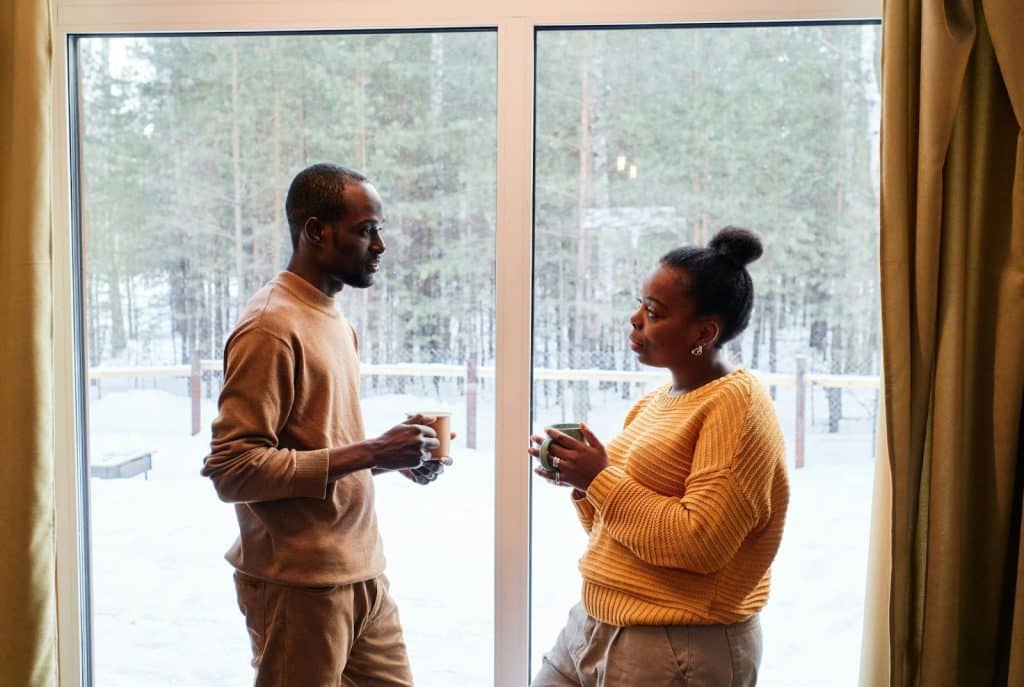
In the beginning, communication feels natural, late-night talks, shared laughter, open vulnerability. But over time, those same conversations can start to feel heavy. It’s not that love fades; it’s that understanding becomes harder to reach. Both people think they’re communicating, yet each feels increasingly unheard. The tone changes. Words are chosen carefully, not to express but to avoid conflict.
Good communication becomes effortful when safety disappears. The more they talk, the less connected they feel, not because they stopped caring, but because they started protecting themselves.
When Listening Turns Into Waiting to Respond

Healthy communication thrives on curiosity, not combat. But eventually, listening stops being about understanding and starts being about defense. Each person begins forming replies before the other even finishes. The dialogue becomes a debate rather than a bridge.
It’s no longer “I want to understand you,” but “I need you to see that I’m right.” Emotional safety turns into a scoreboard. This is the first quiet fracture, when love feels like negotiation instead of empathy.
Honesty That Feels Like Criticism

At first, honesty feels freeing. Over time, it can begin to sting. Words that were once meant to connect become tools to correct. “Just being honest” becomes the shield behind hurtful remarks. When every truth feels like a critique, openness begins to close.
People start weighing their words, fearing the reaction more than seeking resolution. Communication stops feeling safe, and silence starts feeling easier.
The Slow Drift From Openness to Defensiveness

Every couple reaches a point where sharing begins to feel risky. Vulnerability becomes guarded, not because of disinterest, but exhaustion. When every attempt to express emotion leads to misinterpretation or conflict, walls rise naturally.
Soon, conversations happen out of obligation, not desire. Questions get shorter, answers get safer. It’s not avoidance, it’s self-preservation.
When “Talking It Out” Turns Into Repeating the Same Fight

They call it communication, but it’s really repetition. The same problems resurface, only with new words. Apologies are made but never felt. Promises are given but never change behavior. What started as an effort to fix things became a cycle of déjà vu.
When issues don’t evolve, words lose their weight. Communication stops feeling productive and starts feeling pointless, the perfect breeding ground for resentment.
Over-Explaining Becomes a Defense Mechanism

When trust erodes, so does simplicity. Every statement starts needing justification. Every emotion must come with proof. One partner begins to over-explain to avoid being misunderstood, while the other feels suffocated by the constant need for reassurance.
This kind of communication doesn’t build clarity, it builds exhaustion. Over time, both stop speaking altogether, believing that silence is safer than another round of miscommunication.
When Silence Feels Like Maturity

Some couples mistake silence for growth. They stop arguing, stop explaining, and call it “peace.” But peace without expression is just emotional avoidance. It’s a calm surface hiding deep frustration.
Real maturity isn’t the absence of conflict, it’s the ability to handle it without resentment. Silence doesn’t mean things are fixed. It means they’ve stopped believing they can be.
Emotional Withdrawal Disguised as Calm

He no longer reacts. She no longer asks. Both assume this stillness is balance, when in reality, it’s disconnection. Emotional withdrawal looks calm from the outside but feels hollow from within.
When communication dies, affection follows quietly. They share space, but not intimacy. The conversations continue, but the connection doesn’t.
When Vulnerability Starts Feeling Like Weakness

At some point, opening up stops feeling safe. One person shares, the other minimizes. Over time, the vulnerable one learns to shut down. It’s easier to stay quiet than to be dismissed.
When communication stops honoring emotion, people start protecting their hearts. What was once an open exchange becomes a silent endurance.
The Shift From Curiosity to Assumption

Once, they asked to understand. Now, they assume they already know. The space for curiosity shrinks as familiarity grows. But the truth is, no one ever fully knows another person, not even after years together.
When partners stop asking, they stop discovering. And without discovery, love becomes routine. Resentment thrives where curiosity dies.
When “I’m Fine” Becomes the Default Response

Few words carry more unspoken weight than “I’m fine.” It signals exhaustion, not peace. It’s what people say when they no longer believe that explaining will change anything. Over time, “I’m fine” replaces every real emotion, disappointment, sadness, anger, even fear.
This is how good communication dies quietly. Not in shouting, but in surrender.
When Fixing Replaces Feeling

Not every problem needs a solution. Sometimes, people just want empathy, not advice. But when one partner constantly tries to fix things, the other starts feeling unseen.
They stop sharing feelings because they don’t want solutions; they want connection. What begins as helpfulness turns into dismissal, and love starts losing its depth.
Sarcasm Replaces Sincerity

When communication grows tense, humor becomes a defense. Sarcasm sneaks into serious conversations, softening truths that are too hard to admit. But constant irony breeds distance. It creates laughter without warmth, noise without intimacy.
Sarcasm hides pain but never heals it. In time, sincerity feels awkward, and silence feels safer.
When Accountability Turns Into Blame

Healthy relationships require responsibility. But when partners start focusing more on who’s right than what’s wrong, accountability turns into accusation. Every discussion becomes an autopsy of fault instead of a pathway to healing.
Blame kills safety. When everything becomes evidence, vulnerability disappears, and resentment quietly takes its place.
Politeness That Feels Cold

Over time, some couples replace authenticity with civility. They stop arguing, but only because they’ve started pretending. “Please” and “thank you” become substitutes for real emotional exchange. The relationship looks functional but feels empty.
It’s the politeness of strangers, not the comfort of lovers. When people prioritize appearances over honesty, resentment grows beneath the surface.
The Disappearance of Small Talk

Small talk once filled the gaps between deeper conversations, now, the silence feels too heavy to fill. They talk about bills, schedules, or logistics, but never about feelings or dreams.
The casual connection that once kept things light disappears. Without small talk, relationships lose playfulness, and without playfulness, they lose warmth.
When One Person Carries All the Conversations

In some relationships, communication dies because only one person keeps it alive. One partner asks, shares, checks in, while the other replies with minimal effort. It’s not always intentional, but the imbalance grows noticeable.
When effort becomes one-sided, resentment quietly forms. Love can’t thrive where one person keeps talking to an echo.
When Fear Replaces Transparency

Communication fails not because of lies, but because of fear, fear of conflict, judgment, rejection, or emotional exhaustion. So, the truth gets edited. Feelings get softened. Honesty becomes partial.
When fear dictates what’s safe to say, authenticity dies. Silence, once temporary, becomes permanent.
Conclusion: When Words Stop Feeling Safe

Communication isn’t just about talking, it’s about trust. When words begin to carry tension instead of understanding, resentment becomes inevitable. It builds slowly, hidden behind calm tones and polite exchanges.
Every relationship drifts toward silence if understanding is replaced by self-defense. The cure isn’t more talking; it’s safer listening. Real communication doesn’t mean saying everything, it means knowing that when you finally speak, you’ll be heard.






Ask Me Anything